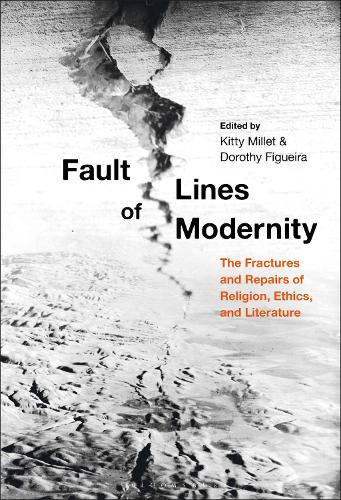
Fault Lines of Modernity: The Fractures and Repairs of Religion, Ethics, and Literature
(Paperback)
Available Formats
Publishing Details
Fault Lines of Modernity: The Fractures and Repairs of Religion, Ethics, and Literature
By (Author) Professor Kitty Millet
Edited by Dorothy Figueira
Bloomsbury Publishing PLC
Bloomsbury Academic USA
19th March 2020
United States
Classifications
Tertiary Education
Non Fiction
Literary studies: general
Philosophy of religion
809.9112
Physical Properties
Paperback
272
Width 152mm, Height 229mm
367g
Description
This state of the art collection offers fresh perspectives on why intersections between literature, religion, and ethics can address the fault lines of modernity and are not necessarily the cause of modernitys faults. From a diverse cohort of scholars from around the world, with appointments in comparative literature and other disciplines, the essays suggest that the imagined hegemony of a Judeo-Christian Western project is neither exclusively true nor productive. However, the essays also suggest that elements of the Western religious traditions are important vectors for understanding modernitys complicated relationship to the past.
Reviews
The project undertaken in Fault Lines of Modernity: The Fractures and Repairs of Religion, Ethics, and Literature is, by nature of its subject, large, complex, and at times contradictory. It is also fascinating, compelling, and thought provoking. * Recherche Littraire *
This thoughtful collection of essays raises important questions about the role of literature and religion in today's fractured world, inviting us to rethink the boundaries that have been constructed between religion, ethics and literature and to broaden our vision beyond the traditions of Western culture. * Susan Bassnett, Professor Emerita of Comparative Literature, University of Warwick, UK, and Professor of Comparative Literature, University of Glasgow, UK *
Against prevailing trends, Fault Lines of Modernity shows the power of reading great literature to engage urgent ethical and religious problems. From mystery fiction to mysticism, the works examined here provide sites of transcendence that expose modern divisions and ways to overcome them. * Brian Britt, Professor of Religion and Culture, Virginia Tech, USA *
What does it mean to study literature in our time of crisis What could or should it mean A shared commitment to critical self-awareness and reflection on the grounds and aims of literary study unifies the diversity of perspectives represented here, which take a distinctive approach to famous (or infamous) disputes regarding literatures ambitions. The contested boundaries among literature, religion, and ethics serve as the starting point; the essays navigate these boundaries, and the tensions between assumptions of universality, on the one hand, and the rights of the marginalized and the irreducibly particular, on the other. The journeys through this fraught terrain draw our attention back to what has always been at stake: the complexity of human needs in times of cultural crisis, and literatures potential role in their redemption. * Susan McReynolds, Associate Professor of Slavic Languages and Literatures, Northwestern University, USA *
Author Bio
Kitty Millet is Professor of Comparative Jewish Literatures and Holocaust Studies, as well as Chair of the Department of Jewish Studies, at San Francisco State University, USA. She is also chairperson of the International Comparative Literature Association (ICLA) research committee on Religion, Ethics, and Literature. Her book, The Victims of Slavery, Colonization, and the Holocaust: A Comparative History of Persecution (Bloomsbury, 2017), analyzes the constitutive side of victimization within three groups, slaves in the Americas, Africans under German colonization, and death camp survivors of the Reinhard camps. Dorothy Figueira is Distinguished Professor of Comparative Literature at the University of Georgia, USA. She is the author of three books, including Otherwise Occupied: Theories and Pedagogies of Alterity (2008), and the editor of three books. She is past President of the International Comparative Literature Association (2005-6), former Editor of The Comparatist (2007-2011), and current Editor of the journal, Recherche littraire/ Literary Research.
